Nordhær: Difference between revisions
Continuator (talk | contribs) |
Continuator (talk | contribs) |
||
| Line 251: | Line 251: | ||
|[[BK-IV Bastiat#Variants|BK-IV 155 mm self-propelled howitzer]]||{{team flag|Nouvelle Alexandrie|name=United Manufacturing Corporation}}||155 mm self-propelled howitzer / field gun||600||[[image:BK-IV Bastiat 155 mm SPH.png|250px]]||Ordered {{AN|1719}} | |[[BK-IV Bastiat#Variants|BK-IV 155 mm self-propelled howitzer]]||{{team flag|Nouvelle Alexandrie|name=United Manufacturing Corporation}}||155 mm self-propelled howitzer / field gun||600||[[image:BK-IV Bastiat 155 mm SPH.png|250px]]||Ordered {{AN|1719}} | ||
|- | |- | ||
|[[M1681 105 mm howitzer]]||{{team flag|Nouvelle Alexandrie|name=United Manufacturing Corporation}}||Towed Artillery|| | |[[M1681 105 mm howitzer]]||{{team flag|Nouvelle Alexandrie|name=United Manufacturing Corporation}}||Towed Artillery||800||[[file:M1681 105 mm howitzer.png|250px]]||Ordered {{AN|1719}} | ||
|- | |- | ||
| colspan="6" style="font-weight:bold; background-color:#dddddd;" | Armoured Combat Vehicles | | colspan="6" style="font-weight:bold; background-color:#dddddd;" | Armoured Combat Vehicles | ||
Revision as of 16:13, 8 February 2024
| Nordhær | |
| Country |
|
|---|---|
| Type | Armed Forces |
| Size |
|
| Garrison/HQ | Elijah's Rest |
| Commanders | |
| Överbefälhavaren | Ragnar Filip Tarjeisson |
| King of Normark | Fredrik Michael Tarjeisson |
The Nordhær is the armed forces of the King of Normark, established in 1703 AN following the country's independence from Elluenuueq.
Along with the Elian Militia, the Nordhær contributes its whole force to Banner Group North, a formation of the Raspur Pact that is subordinate to the Keltian Continental Theatre Command.
Leadership
| Office | Officeholder | Date Appointed |
|---|---|---|
| Överbefälhavaren | General Ragnar Filip Tarjeisson | 20.VI.1719 AN |
| Director General | Generallöjtnant Jørgen Dahle | 20.VI.1703 AN |
| Chief of the Defence Staff | Generalmajor Karl Munter | 20.VI.1703 AN |
| Commander Armed Forces Headquarters | Generalmajor Alf Einhorn | 20.VI.1703 AN |
| Chief Financial Officer | Brigadgeneral Georg Lysne | 20.VI.1703 AN |
| Chief of Armed Forces Training & Development Staff | Brigadgeneral Carl-Petter Carstensen | 20.VI.1703 AN |
| Director of Human Resources | Brigadgeneral Henrik Koldebolt | 20.VI.1703 AN |
| Director of Joint Operations | Brigadgeneral Jonas Dahling Einhorn | 20.VI.1703 AN |
| Director of Military Intelligence | Brigadgeneral Josue Askeland Carstensen | 20.VI.1703 AN |
Within the framework of government decisions and objectives on defence, the Överbefälhavaren, appointed by the King, manages the strategic and operational level activities of the Nordhær.
The Överbefälhavaren is assisted primarily by the Director General and Armed Forces Command, while Headquarters assists the Supreme Commander in matters of high-level command. At a local level, the Supreme Commander is assisted by the heads of local units, schools and training centres.
Armed Forces Headquarters comprises the Överbefälhavaren, the Director General, the Chief of Defence Staff and Commander Armed Forces Headquarters, the Chief Financial Officer, (CFO), the Chief of Armed Forces Training and Development Staff, the Director of Human Resources, the Chief of Joint Operations, and the Director of Military Intelligence.
Organisation
Order of Battle (overview)
- Nordhær
- Överbefälhavaren
- Armed Forces Headquarters
- Land Forces Command
- Maritime Forces Command
- Aerospace Forces Command
- Commissariat & Logistics Command
- Överbefälhavaren
Armed Forces Headquarters
- Armed Forces Headquarters
- Armed Forces Training and Development Staff
- Directorate of the Defence Staff
- Administration Bureau
- Communications Bureau
- Directorate of Human Resources
- Directorate of Military Intelligence
- Joint Operations Command
Land Forces Command
- Land Forces Command
- I Corps
- Life Guards Brigade
- 1st Command & Control Regiment
- Regiment of Dragoons
- Regiment of Hussars
- 1st Area Defence Regiment
- 1st Commissariat Regiment
- 1st Logistics Brigade
- 2nd Command & Control Regiment
- 2nd Commissariat Regiment
- 1st Engineering Regiment
- 1st Transportation Regiment
- 1st Sanitation Regiment
- Blue Division
- 5th Command & Control Regiment
- 1st Brigade of Foot
- 2nd Brigade of Foot
- 3rd Commissariat Regiment
- Red Division
- 6th Command & Control Regiment
- 3rd Brigade of Foot
- 4th Brigade of Foot
- 4th Commissariat Regiment
- 1st Field Engineering Brigade
- 7th Commissariat Regiment
- Life Guards Brigade
- Area Defence Corps
- 7th Command & Control Regiment
- Division of Artillery
- 8th Command & Control Regiment
- Anti-Tank Artillery Brigade
- Howitzer Brigade
- 1st Motorcycle Security Regiment
- 5th Commissariat Regiment
- Division of Flak-Defences
- 9th Command & Control Regiment
- Motorised-Flak Brigade
- Surface-to-Air Artillery Brigade
- 2nd Motorcycle Security Regiment
- 6th Commissariat Regiment
- 2nd Field Engineering Brigade
- 8th Commissariat Regiment
- II (Reserve) Corps
- 1st Reserve Division
- 10th Command & Control Regiment
- 1st Reserve (I Slevik) Brigade
- 2nd Reserve (I Jelsinga) Brigade
- 1st Reserve (I Eikbu) Demi-Brigade
- 9th Commissariat Regiment
- 1st Reserve Division
- III (Reserve) Corps
- 2nd (Reserve) Division
- 3rd Reserve (I Konungsheim) Brigade
- 4th Reserve (II Konungsheim) Brigade
- 5th Reserve (III Konungsheim) Brigade
- 2nd (Reserve) Division
- IV (Reserve) Corps
- I Corps
Maritime Forces Command
- Maritime Forces Command
- Admiralty
- Lords of the Admiralty
- Royal Yacht Squadron
- White Fleet
- 3rd Command & Control Regiment
- Cruiser Division (inactive)
- Centre Division
- Rear Division
- Small Craft Flotilla
- Red Fleet
- 4th Command & Control Regiment
- Cruiser Division (inactive)
- Centre Division
- Rear Division
- Small Craft Flotilla
- Underseas Warfare Fleet
- Naval Dockyards Establishment
- Main Directorate of Maritime Navigation Support and the Hydrographic Survey
- Icebreaking Division East
- Icebreaking Division West
- Boreal Survey Group
- Soundings Mission
- Lords of the Admiralty
- Admiralty
Aerospace Forces Command
- Aerospace Forces Command
- Training & Familiarisation Squadron
- Normark Air Fleet (NAX)
- Army Co-operation Corps
- Maritime Patrol Corps
- Observation Corps
- Sustainment Corps
Commissariat & Logistics Command
- Commissariat & Logistics Command
- Corps of the Grand Commissariat
- Logistics Division
- Transportation Division
- Women's Auxiliary Division
- Sanitation Corps
- Field Ambulance Division
- Auxiliary Nursing Division
- Veterinary Services Division
- Corps of the Grand Commissariat
Establishment
Following on from the experiences of the Liberation of Dalen (1717–1720), the Nordhær re-categorised its equipment and manpower into three tiers according to their comparative excellence and efficiency. These being:
- 1st Line: The best personnel, at the peak of physical condition, and benefiting from the best available training. To be equipped with the most modern equipment (post 1700). Forming the first echelon in combat operations.
- 2nd Line: For those less able but still capable of acceptable performance. Liable to be utilised for the second echelon in combat operations and for combat support services. Generally to be equipped with equipment that is obsolescent but not yet obsolete (1671-1699).
- 3rd Line: Mediocre personnel, only suitable for rear area work and static defence duties. Would constitute the third echelon only in combat operations that required the application of sufficient mass for the momentum of the preceding two echelons to achieve a breakthrough. Primarily to be assigned to logistics and security operations. Usually to be equipped with whatever obsolete equipment (1651-1670) is available.
Equipment
1st Line equipment
| Name | Origin | Type | № in Service | Image | Notes |
|---|---|---|---|---|---|
| M1701 158mm MLRS | Rocket Artillery | 800 | 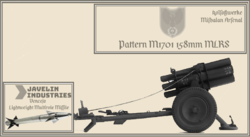 |
Ordered 1719 AN | |
| Armoured Combat Vehicles | |||||
| Ahvaz Psilos IMV | Infantry Mobility Vehicle | 1,200 | 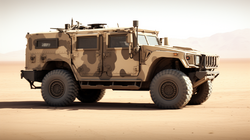 |
Ordered 1719 AN | |
| BK-VIII Light Infantry Scout Vehicle | Armoured Personnel Carrier (Scout) | 22,600 | 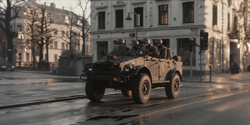 |
Ordered 1722 AN. | |
| Support Vehicles | |||||
| Rz.Kfz 1714 Razkampfwagen | Mine-Resistant Ambush Protected Vehicle | 7,725 |  |
Ordered in tranches between 1714 AN and 1718 AN, delivered by 1724 AN. | |
| Infantry equipment | |||||
| Aviation – Fixed Wing | |||||
| F-19 Greystrike | Multirole strike fighter | 21 / 72 | 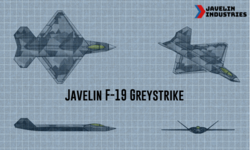 |
Ordered 1719 AN | |
| T-6/A-6 Víbora | Training Aircraft | 67 | 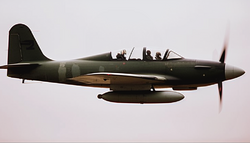 |
| |
| Aviation – Rotary | |||||
2nd Line equipment
| Name | Origin | Type | № in Service | Image | Notes |
|---|---|---|---|---|---|
| Artillery | |||||
| BK-IV 155 mm self-propelled howitzer | 155 mm self-propelled howitzer / field gun | 600 |  |
Ordered 1719 AN | |
| M1681 105 mm howitzer | Towed Artillery | 800 |  |
Ordered 1719 AN | |
| Armoured Combat Vehicles | |||||
| Support Vehicles | |||||
| Specialist Vehicles | |||||
| Aviation – Fixed Wing | |||||
| T-5/A-5 Tejón de Miel | Light Attack Aircraft/Jet Trainer | 494 / 1,200 | 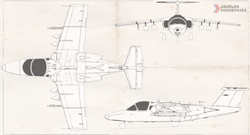 |
| |
3rd Line equipment
| Name | Origin | Type | № in Service | Image | Notes |
|---|---|---|---|---|---|
| Armoured Combat Vehicles | |||||
| Horjin Combat Vehicle 56 | Infantry Fighting Vehicle | 600 |  |
||
| 40 | Delivered 1706–1713 | ||||
| Support Vehicles | |||||
| Light Truck | Transport Utility Vehicle | 72,000 |  |
||
| 600 | Delivered 1706–1713 | ||||
| Snatch Land Rover | Utility vehicle | 10,032 / 38,000 |  |
Ordered 1719 AN | |
| Specialist Vehicles | |||||
| Aviation – Fixed Wing | |||||
| T-2/A-2 Saeqeh | Training and light attack aircraft | 810 | Transferred from the Natopian Defense Force, 1727 AN | ||
| T-3 Akóntio | Training and light attack aircraft | 220 | Transferred from the Natopian Defense Force, 1727 AN | ||
Manpower
For reasons of economy it would not be feasible to maintain the full strength of the Nordhær on the active service list during peacetime. As such a cadre system is operated whereby two thirds of first line manpower are retained on full pay, a third of second line manpower on half-pay, and a quarter of third line manpower on quarter-pay. The remainder are instead placed on the active reserve list, and paid a monthly retainer in return for participating in weekly parade drills for their assigned squadrons, monthly regimental musters, and annual division exercises.
1st Line manpower
- Land Command: 36,000 (30 regiments)
- 24,000 on active service
- 12,000 in reserve
- Maritime Command: 3,700 (3 regiments)
- 2,442 on active service
- 1,258 in reserve
- Aviation Command: 3,650 (3 regiments)
- 2,409 on active service
- 1,241 in reserve
2nd Line manpower
- Land Command: 75,000 (62 regiments)
- 24,750 on active service
- 50,250 in reserve
- Maritime Command: 9,450 (7 regiments)
- 3,118 on active service
- 6,332 in reserve
- Aviation Command: 12,074 (10 regiments)
- 3,984 on active service
- 8,090 in reserve
3rd Line manpower
- Land Command: 117,000 (97 regiments)
- 29,250 on active service
- 87,750 in reserve
- Maritime Command: 32,000 (26 regiments)
- 8,000 on active service
- 24,000 in reserve
- Aviation Command: 32,740 (27 regiments)
- 8,185 on active service
- 24,555 in reserve
History
The Nordhær was the locally given name for a formation that commenced its existence officially recorded as being the Garrison of the Elwynnese Volunteer Armed Forces in Normark (GEVAFN), an entity established in 1703 AN following the disbandment of the Union Defence Force in 1702 AN. Because of the constitutionally anomalous condition of Normark, outside the bounds of the Benacian Union but still subject to a member state, Elwynn in this instance, the conscripts of the UDF were not re-enlisted into the Benacian Union Defence Force but were rather notified at their last pay parade of 1702 AN that the choice before them was to either accept a transfer to a garrison on Leng or else to volunteer for a five year term of engagement with the GEVAFN. In view of the offered alternative, the rate of voluntary enlistments was reported as being "satisfactory".
The Nordhær was planned to have undergone a major reorganisation in 1706 AN in preparation for the campaigns that would need to be undertaken to establish land corridors connecting the Kingdom to the Hexarchy and New Alexandria. However, owing to fiscal constraints, particularly to the global impact of the Recession of 1709, this reorganisation subsequently failed to benefit from any substantial increase in funding or materiel prior to 1714 AN.
Air assets assigned to the Aviation Command of the Nordhær were evenly divided between the Army Co-operation Corps and the Maritime Patrol Corps, with the exception of the Training & Familiarisation Squadron, which operates a limited number of training aircraft assembled by Sårensby Arsenal, were directly subordinate to Aviation Command. For the GAV(P)-5 Nereid four numbered squadrons (I to IV) were established alongside two operational conversion flights, covering a total inventory of seventy-five gravimetric airframes inherited from Keltia Command upon the departure of the Union Defence Force in 1702 AN. Of the far more numerous R-1 Whirdlebird, the long serving workhorse rotorcraft of Shireroth and its successors, twenty-four army co-operation squadrons and twenty-four maritime patrol squadrons were established, along with two operational conversion squadrons with one attached to each corps, amounting to 1,200 airframes in varying states of repair and mechanical reliability. Attempts to restart aircraft manufacturing at Sårensby Arsenal had, beyond the assembly of a few abandoned airframes, faltered at the outset of Normark's second period of independence, leaving the Aviation Command heavily reliant upon the slow Nereid's as the sole aircraft capable of carrying its scant stock of S-2 Standard Missiles on air-defence and strike missions, in spite of the perilous limitations inherent on relying upon the overly mechanically complicated and temperamental gravimetric propulsion systems of such a craft.
By 1719 AN, in the aftermath of the disastrous attempt to effect the liberation of Dalen, the Nordhær had been forced into a headlong retreat towards Elijah's Rest by the Confederacy of the Dispossessed. In consequence, all formations were severely ill-equipped and undermanned, with only 63,349 men of all ranks available for duty on 24.XII.1719 AN.